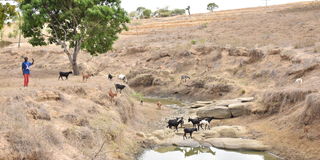Governor Achani declares drought emergency in Kwale

A herder walks with his livestock in search of water and pasture in Mavirivirini area of Kinango, Kwale. Kenya Red Cross has announced plans to buy livestock in drought-stricken county.
Kwale Governor Fatuma Achani has declared drought an emergency in the county, calling on well-wishers to raise at least Sh270 million to address the dire situation.
Through the County Drought Coordinating Committee, which she chairs, the governor said at least 200,000 residents are at risk of hunger and urgent intervention was needed.
“All our sub-counties are experiencing drought, especially in Kinango, Samburu and Lungalunga. Parts of Msambweni and Matuga are also dry after receiving inadequate rain,” Ms Achani said.
She explained that the county government could not address the problem alone and well-wishers needed to come on board.
She said several boreholes dug by the county were not operational, while dams were drying up.
The financial aid, she said, would cover a livestock offtake programme (Sh50 million), livestock feeds (Sh60 million), animal vaccination (Sh4 million) and livestock treatment (Sh3 million).
Some Sh20 million is also required to repair dams and boreholes.
The situation is so bad, she said, that the Nyalani Dam, which the county depends on for irrigation, is at risk of drying up.
“We need money to desilt the water, put a fence around it and set up cattle troughs at Sh80 million so that it does not dry up,” she said.
The county had started receiving aid from non-governmental organisations such as the Red Cross, World Food Programme and Plan International.
Meanwhile, Kwale County Commissioner Gilbert Oyagi has said the county is expected to receive relief food from the government this week.
Once received, a committee will select which areas will receive the food first.
Committees will hold meetings in every sub-county, ward and village to ensure that the food reaches those who deserve it, Mr Oyagi said.
“There will be ward and village committees to make sure only those who require relief food get the aid,” he said.
He also set conditions for well-wishers who want to distribute food, water or other items.
The must be cleared by the Drought Steering Committee headed by Ms Achani before proceeding to assist the community.
“We want to avoid duplication of aid. That is why it is important that anyone willing to help us first go through the committee before going ahead with their donations,” he said.
The drought in Kwale has worsened since July, with residents of Samburu, Kinango and Lungalunga the most affected.
For instance, in Lungalunga, elephants that leave Tsavo National Park in search of pasture and water invade community water pans, causing shortages for residents.
The wild animals also attack villagers and destroy crops on farms.
Mr Oyagi urged residents to report to the Kenya Wildlife Service (KWS) when they spot the animals.





